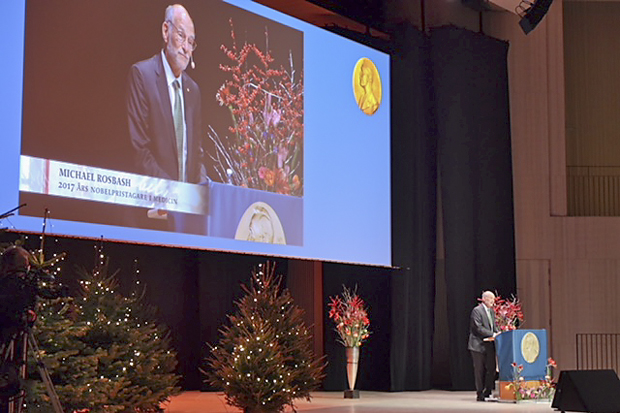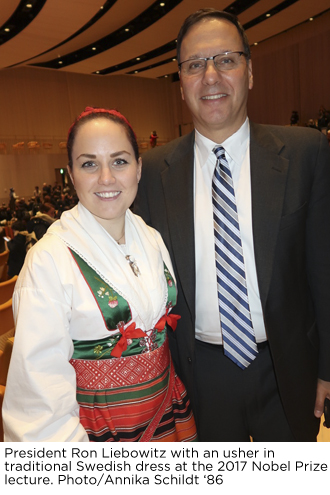Rosbash and Hall deliver their Nobel lectures
Before a packed crowd of nearly 1,000 people who gave them two standing ovations, professors Michael Rosbash and Jeff Hall delivered their Nobel lectures
 Annika Schildt '86
Annika Schildt '86Professor Michael Rosbash
Before a packed crowd of nearly 1,000 people who gave them two standing ovations, professors Michael Rosbash and Jeff Hall delivered their Nobel lectures, thanking past students, acknowledging debts to other scientists, and heaping praise on the animals they used in their research — fruit flies.
The event at the Karolinska Institute, the prestigious medical university in Stockholm, is one of the highlights of Nobel Week. The auditorium’s large stage was decorated with small Christmas trees wrapped in lights and, in keeping with a Nobel tradition, the ushers wore traditional Swedish folk costumes. (You can watch the lectures on the Nobel Prize YouTube channel.)
Hall and Rosbash won this year’s Nobel Prize in Physiology or Medicine for identifying the processes inside cells that drive circadian rhythms. They shared the prize with The Rockefeller University’s Michael Young, who also did pioneering work on circadian rhythms and delivered his own speech at the gathering.
Receiving the award “has left me speechless,” Rosbash said at the outset of his address, “but being speechless is not really appropriate here, so I’m afraid I am going to have to screw up my courage and say something.”
 He recounted the trajectory of his and Hall’s research from the early days in the 1980s when they cloned the gene controlling the fly’s circadian rhythms, to the early 1990s when they explained the workings of the insect’s master biological clock. It was slow going, particularly during the time when they were looking for the protein linked to circadian rhythms. “We spent several years struggling to find the promised land from the desert,” said Rosbash, the Peter Gruber Endowed Chair in Neuroscience.
He recounted the trajectory of his and Hall’s research from the early days in the 1980s when they cloned the gene controlling the fly’s circadian rhythms, to the early 1990s when they explained the workings of the insect’s master biological clock. It was slow going, particularly during the time when they were looking for the protein linked to circadian rhythms. “We spent several years struggling to find the promised land from the desert,” said Rosbash, the Peter Gruber Endowed Chair in Neuroscience.
Rosbash said his persistence allowed him to overcome obstacles. His motivation came, he said, from his view of science as a “romantic profession.” “You don’t know what you’re going to discover. Every day is an adventure,” he said. “It’s really a great privilege, a joy.”
He also acknowledged the work done by the graduate students and postdoctoral fellows in his lab over the years. “I was smart enough to stay out of the way of talented people and let them make progress,” he said.
Then, of course, there was his long-time collaborator, Jeff Hall. Both men started at Brandeis in 1974 and shared a passion for sports, bawdy jokes and rock ’n’ roll. Rosbash likened their partnership to the English musical team of Gilbert and Sullivan, who were extraordinarily productive, but, Rosbash said, “absolutely drove each other completely crazy.” Hall and I “have strong personality differences,” Rosbash added, “but we embrace those differences as an asset to the work.”
Those differences were on display during Hall’s talk. Where Rosbash was focused and scientific, armed with PowerPoint slides of graphs and data, Hall, a professor emeritus, recounted personal anecdotes, made jokes and asides, and went on so long that the moderator almost came on stage to cut him off. He also wore a baseball cap emblazoned with “Brawndo,” a reference to a made-up sports drink in “Idiocracy,” one of his favorite movies.
He called the late Nobel laureate Ed Lewis a “funky little fellow” and “cute as a button.” He used the words “bibbelydoo” and “chrono-jibberish” and made jokes about Americans being illiterate and believing the world is only 6,000 years old. The audience frequently broke into laughter.
But Hall’s speech was also profound, describing the ties between the pioneering scientists over the last 100 years who’ve achieved major breakthroughs in our understanding of genetics using fruit flies. Many of them mentored each other. They also shared a belief that genes determined behavior and not just characteristics like height or eye color. Hall and Rosbash’s research showing the link between genes and the fly’s mating, sleeping and eating habits — all part of the insect’s circadian rhythms — proved how true this really was.
Hall said this year’s Nobel should also have been given to fruit flies. “It’s almost like in some stupid mystical way, [fruit flies] say, “My God, if you’re going to work with me seriously, if you know what you’re doing and you care, I’m going to give up a secret.”
Citing the long list of scientists who’ve worked with flies and won Nobels, Hall quipped, “Some day, come on guys, give a prize to an invertebrate. It’ll be funky.”
Categories: Research, Science and Technology





